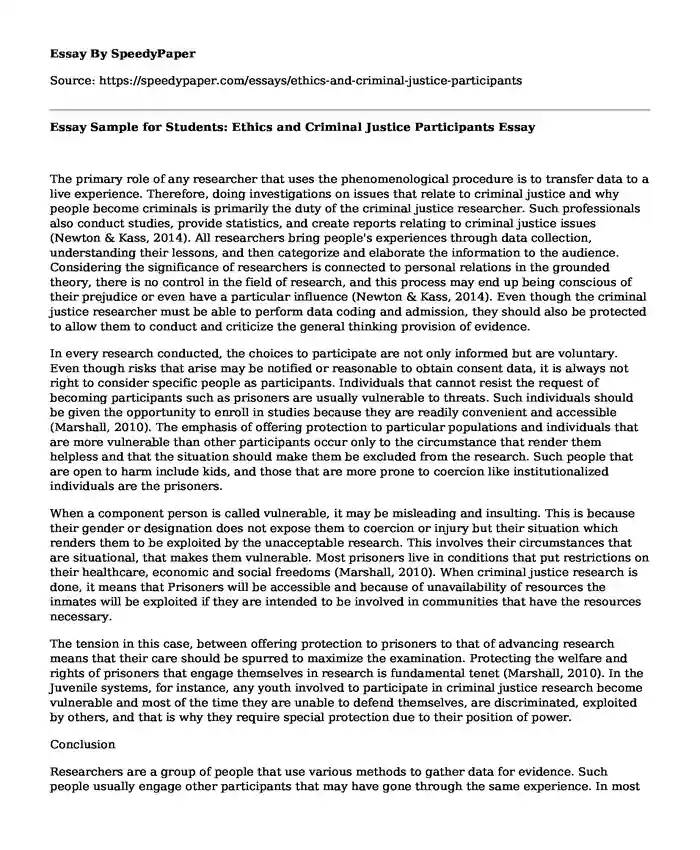
| Type of paper: | Essay |
| Categories: | Ethics Criminal justice |
| Pages: | 3 |
| Wordcount: | 622 words |
The primary role of any researcher that uses the phenomenological procedure is to transfer data to a live experience. Therefore, doing investigations on issues that relate to criminal justice and why people become criminals is primarily the duty of the criminal justice researcher. Such professionals also conduct studies, provide statistics, and create reports relating to criminal justice issues (Newton & Kass, 2014). All researchers bring people's experiences through data collection, understanding their lessons, and then categorize and elaborate the information to the audience. Considering the significance of researchers is connected to personal relations in the grounded theory, there is no control in the field of research, and this process may end up being conscious of their prejudice or even have a particular influence (Newton & Kass, 2014). Even though the criminal justice researcher must be able to perform data coding and admission, they should also be protected to allow them to conduct and criticize the general thinking provision of evidence.
In every research conducted, the choices to participate are not only informed but are voluntary. Even though risks that arise may be notified or reasonable to obtain consent data, it is always not right to consider specific people as participants. Individuals that cannot resist the request of becoming participants such as prisoners are usually vulnerable to threats. Such individuals should be given the opportunity to enroll in studies because they are readily convenient and accessible (Marshall, 2010). The emphasis of offering protection to particular populations and individuals that are more vulnerable than other participants occur only to the circumstance that render them helpless and that the situation should make them be excluded from the research. Such people that are open to harm include kids, and those that are more prone to coercion like institutionalized individuals are the prisoners.
When a component person is called vulnerable, it may be misleading and insulting. This is because their gender or designation does not expose them to coercion or injury but their situation which renders them to be exploited by the unacceptable research. This involves their circumstances that are situational, that makes them vulnerable. Most prisoners live in conditions that put restrictions on their healthcare, economic and social freedoms (Marshall, 2010). When criminal justice research is done, it means that Prisoners will be accessible and because of unavailability of resources the inmates will be exploited if they are intended to be involved in communities that have the resources necessary.
The tension in this case, between offering protection to prisoners to that of advancing research means that their care should be spurred to maximize the examination. Protecting the welfare and rights of prisoners that engage themselves in research is fundamental tenet (Marshall, 2010). In the Juvenile systems, for instance, any youth involved to participate in criminal justice research become vulnerable and most of the time they are unable to defend themselves, are discriminated, exploited by others, and that is why they require special protection due to their position of power.
Conclusion
Researchers are a group of people that use various methods to gather data for evidence. Such people usually engage other participants that may have gone through the same experience. In most cases, the participants have no control in the field of research, and this process may end up being conscious of their prejudice or even have particular influence. In most cases, this group of people ends up being vulnerable, and anyone can harm them. It is therefore, vital to protect such groups of people to enable gather answers after the study has been completed.
References
Marshall, C. E. (2010). Research methods in criminal justice and criminology. Journal of Criminal Justice, 12(5), 511-512. doi:10.1016/0047-2352(84)90099-0
Newton, S., & Kass, N. (2014). Exploitation of prisoners in clinical research: Perceptions of study participants. 111-132.
Cite this page
Essay Sample for Students: Ethics and Criminal Justice Participants. (2022, Nov 07). Retrieved from https://speedypaper.com/essays/ethics-and-criminal-justice-participants
Request Removal
If you are the original author of this essay and no longer wish to have it published on the SpeedyPaper website, please click below to request its removal:
- Essay Sample Describing the Meaning of Happiness
- Effects of Eating Fast Food, Essay Samples
- Narrative Argument about Education, Free Essay
- Never Let Me Go by Kazuo Ishiguro. Free Essay.
- Sport Essay Example: Cricket Versus Baseball
- Movie Essay Sample on Cave of Forgotten Dreams: Chauvet Cave as the Home of Homo Spiritualis
- Essay Sample on Self-Psychology Theory
Popular categories




